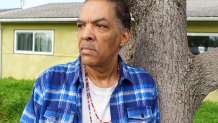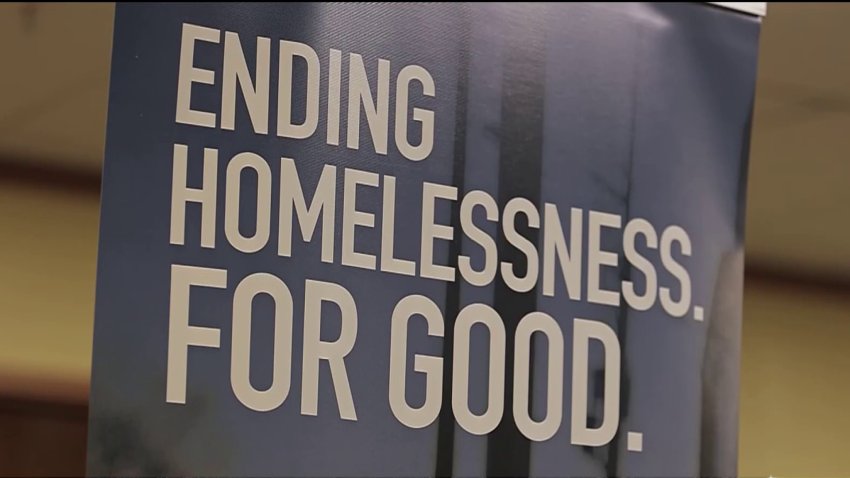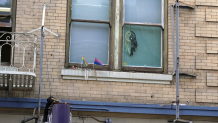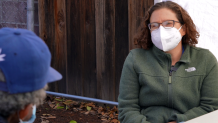Children, seniors with disabilities, and men and women living with AIDS are just a few of the groups now in danger of losing their housing in California because of a major delay in funding from the federal government. Those at the helm of homeless prevention initiatives tell the NBC Bay Area Investigative Unit they are in danger of shutting down critical housing programs because contracts to fund their efforts, previously awarded to their organizations under the Biden White House, still have not been signed by the Trump administration.
“It’s very worrying,” said Carol Roberts, president and CEO of Lutheran Social Services of Northern California, which provides housing and supportive services to roughly 6,000 individuals and families across 10 counties.
Roberts says delays in federal funding from the U.S. Department of Housing and Urban Development (HUD) is leaving her organization scrambling to keep its doors open. HUD, late last year, pledged to allocate millions of dollars to the nonprofit as part of an annual competitive process to award government contracts. The nonprofit was told late last year that five of its contracts, which expired earlier this year, were to be renewed. Now, months later, the nonprofit is still waiting on the money -- $2.8 million dollars' worth of reimbursable federal funding to continue the organization's work of housing the homeless.
“HUD is the primary funder of services for homeless individuals in this country, so it's not surprising or unusual that we would have primarily HUD funding.”

Contracts HUD approved last year still haven't been signed
According to Roberts, HUD notified her nonprofit it would be rehiring the organization to house and support hundreds of people in San Francisco, Fairfield, Vallejo, and Sacramento. As a result, when each of those five contracts expired at the start of the year, they were supposed to be renewed. To date, however, HUD has only signed one of those contracts and even that final approval only occurred last month, meaning the nonprofit still hasn’t been paid by the federal government for that program. In fact, Roberts says her nonprofit was forced to take out a loan because of the delay.
There's nothing I can do about it but just wait, see, and hope.
William Johnson, senior with disabilities
Get a weekly recap of the latest San Francisco Bay Area housing news. Sign up for NBC Bay Area’s Housing Deconstructed newsletter.
“It's a very scary thing,” said William Johnson, one of 20 seniors with disabilities in Solano County currently housed by Lutheran Social Services. "There's nothing I can do about it but just wait, see, and hope.”
Johnson, 64, suffers from kidney, heart, and vision problems. He was homeless for about one year before ultimately getting connected to housing, medical care, and other supportive services.

“It was a metamorphosis,” he said. “The program not only helps me have a place to stay, it's to better my life and hopefully better the lives of others.”
Since finding the program, Johnson has earned his associate’s degree and is currently pursuing a bachelor's. He is also the music director of his local church.
“It really boggles my mind that they would hold back these programs,” he said. “The worst part is I have no control over it.”

People with AIDS in danger of losing housing amid federal funding delay
In San Francisco, part of the federal funding slated for Lutheran Social Services was supposed to help house 30 low-income men and women living with AIDS, all trying to rebuild their lives after being incarcerated.
“We’re fronting the costs of those services and as a nonprofit, we do not have substantial reserves,” Roberts said. “These decisions now are being made on a daily basis.”
Roberts expects the problem only to grow across the country. While most HUD contracts, she says, expire toward the end of the year, her programs are unusual since they were set to renew at the beginning of this year. Therefore, the bulk of the delays, she fears, are likely still ahead.
“In some respects, we're like the canary in the coal mine,” Roberts added. “We're one of the first agencies that are affected by this.”

HUD didn't respond to our questions after initially saying it would
NBC Bay Area contacted HUD to find out how many other programs across the country are being impacted by the federal funding delays and to learn what is causing them. The agency, initially, said it would “respond back” with answers but never did.
It is adding an element of chaos.
Dr. Margot Kushel, Benioff Homelessness and Housing Initiative
“It is adding an element of chaos, of unpredictability,” said Dr. Margot Kushel, one of the nation’s leading researchers on homelessness. “This funding is really irreplaceable.”
Kushel, a physician at UC-San Francisco and the head of the Benioff Homelessness and Housing Initiative, says it is nearly impossible to overstate the role the federal government has long played in supporting homeless prevention programs across the nation. HUD doles out more than $3 billion dollars each year to programs helping the homeless.
“In many parts of the country, the federal money is the only funding source," Kushel said. "It funds everything from case management services to shelters to the housing that people need."
Those dollars, however, are becoming increasingly less reliable, she noted.
I think we're talking about playing with people's lives and really putting them at high risk of dying.
Dr. Margot Kushel, Benioff Homelessness and Housing Initiative

“I think we're talking about playing with people's lives and really putting them at high risk of dying,” Kushel said. “I see these delays as that serious.”
Kushel believes the lack of promised funding could have irreversible effects for nonprofits combatting homelessness, potentially forcing some to shut down permanently.
“Remember, these aren't businesses with deep wells of capital,” she said. “When money is promised to them, they understandably expect the bill to be paid.”
Children and those with disabilities, she fears, could be forced onto the streets within just a matter of weeks.
“It's like a rug being pulled out from under you,” Johnson said, recalling what life was like when he became homeless.
“We used to be a more compassionate country,” he said. “I don't know what's going on.”
Contact The Investigative Unit
submit tips | 1-888-996-TIPS | e-mail Bigad




